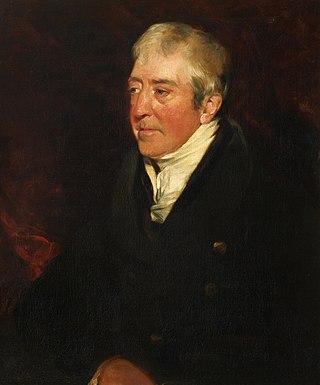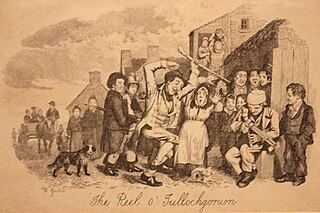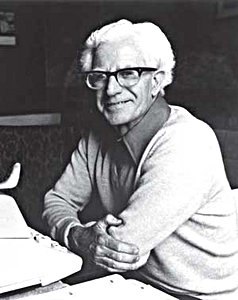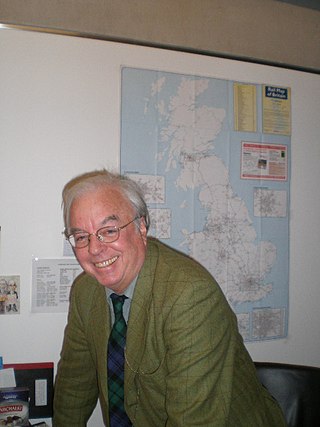Related Research Articles

Alexander Runciman was a Scottish painter of historical and mythological subjects. He was the elder brother of John Runciman, also a painter.

Alexander Nasmyth was a Scottish portrait and landscape painter, a pupil of Allan Ramsay. He also undertook several architectural commissions.

David Scott was a Scottish historical painter.
The Scottish Renaissance was a mainly literary movement of the early to mid-20th century that can be seen as the Scottish version of modernism. It is sometimes referred to as the Scottish literary renaissance, although its influence went beyond literature into music, visual arts, and politics. The writers and artists of the Scottish Renaissance displayed a profound interest in both modern philosophy and technology, as well as incorporating folk influences, and a strong concern for the fate of Scotland's declining languages.
Stephen Maxwell was a Scottish nationalist politician and intellectual and, from the 1980s, a leading figure in the Scottish voluntary sector.

George Jamesone was a Scottish painter who is regarded as Scotland's first eminent portrait-painter.

Dame Elizabeth Violet Blackadder, Mrs Houston, was a Scottish painter and printmaker. She was the first woman to be elected to both the Royal Scottish Academy and the Royal Academy.

Walter Geikie RSA was a Scottish painter.

John Robin Jenkins was a Scottish writer of thirty published novels, the most celebrated being The Cone Gatherers. He also published two collections of short stories.

William Alexander Murray Grigor is a Scottish film-maker, writer, artist, exhibition curator and amateur architect who has served as director of the Edinburgh International Film Festival. He has made over 50 films with a focus on arts and architecture.

Cencrastus was a magazine devoted to Scottish and international literature, arts and affairs, founded after the Referendum of 1979 by students, mainly of Scottish literature at Edinburgh University, and with support from Cairns Craig, then a lecturer in the English Department, with the express intention of perpetuating the devolution debate. It was published three times a year. Its founders were Christine Bold, John Burns, Bill Findlay, Sheila G. Hearn, Glen Murray and Raymond J. Ross. Editors included Glen Murray (1981–1982), Sheila G. Hearn (1982–1984), Geoff Parker (1984–1986) and Cairns Craig (1987). Raymond Ross was publisher and editor of the magazine for nearly 20 years (1987–2006). Latterly the magazine was published with the help of a grant from the Scottish Arts Council. It ceased publication in 2006.

Professor Christopher Harvie is a Scottish historian and a Scottish National Party (SNP) politician. He was a Member of the Scottish Parliament (MSP) for Mid Scotland and Fife from 2007 to 2011. Before his election, he was Professor of British and Irish Studies at the University of Tübingen, Germany.
Fr Ian Anthony Ross was a Scottish born Catholic priest and member of The Order of Preachers (Dominican). He was also a noted broadcaster, writer, community activist, educator and antiquarian who served as Rector of the University of Edinburgh (1979–1982).

Sir John Baptist Medina or John Baptiste de Medina was an artist of Flemish-Spanish origin who worked in England and Scotland, mostly as a portrait painter, though he was also the first illustrator of Paradise Lost by John Milton in 1688.
Victoria Elizabeth Crowe OBE, DHC, FRSE, MA (RCA) RSA, RSW is a Scottish artist known for her portrait and landscape paintings. She has works in several collections including the National Galleries of Scotland, the National Portrait Gallery, London, and the Royal Scottish Academy.
Robert Cairns Craig is a Scottish literary scholar, specialising in Scottish and modernist literature. He has been Glucksman Professor of Irish and Scottish Studies at the University of Aberdeen since 2005. Before that, he taught at the University of Edinburgh, serving as head of the English literature department from 1997 to 2003. He was elected a fellow of the British Academy in 2005.

John Macmillan Herdman is a Scottish novelist, short story writer and literary critic. He is the author of seventeen books including five novels and various works of shorter fiction, a play, two critical studies and a memoir, and he has contributed to twenty other books. His work has been translated, broadcast and anthologized, and taught at universities in France, Australia and Russia.
George Bruce OBE was a Scottish poet and radio journalist.
Janet Hinshaw Caird was a teacher and a 20th-century writer of Scottish mysteries, poems, and short stories. Daughter of Peter Kirkwood, a missionary, and Janet Kirkwood, she was born in Livingstonia, Malawi, and educated in Scotland. She attended Dollar Academy in Dollar, Clackmannanshire, and the University of Edinburgh, graduating with a Master of Arts in English literature in 1935 before further study at the University of Grenoble and the Sorbonne in 1935–36.
Bill Findlay was a Scottish writer and theatre academic. As a translator, editor, critic and advocate, he made an important contribution to Scottish theatre. He worked as a lecturer in the School of Drama at Edinburgh's Queen Margaret University and was a founder editor and regular contributor to the Scottish and international literature, arts and affairs magazine, Cencrastus.
References
- ↑ "HONORARY RSA MEMBERS | Royal Scottish Academy of Art and Architecture". www.royalscottishacademy.org. Retrieved 30 July 2021.
- ↑ "MACMILLAN, Prof. (John) Duncan" . Who's Who . Vol. 2023 (online ed.). A & C Black.(Subscription or UK public library membership required.)
- ↑ "Scottish Art 1460-1990". Publishers Weekly. Retrieved 18 February 2014.
- ↑ Wright, Karen. "Bookmark". Modern Painters. 13 (1): 134.
- ↑ "Scotland: Recommended Books, Films & Music". Frommers. Retrieved 18 February 2014.
- ↑ Craig, Cairns (2007). "Recovering History". In Caroline McCracken-Flesher (ed.). Culture, Nation, and the New Scottish Parliament. Bucknell University Press. p. 34.
- ↑ Thomson, Duncan. "Scotland's best". Times Literary Supplement (London, England), Friday, 5 April 1991; pg. 23; Issue 4592.
- ↑ Lawson, Julie (20 October 2012). "Victoria Crowe by Duncan Macmillan (review)". The Scotsman. Retrieved 18 February 2014.
- ↑ Treason of the Scholars, by Peter Goodfellow with contributions from David Starkey, Roger Scruton and Duncan Macmillan, Panter and Hall, London, UK (2015) ISBN 978-0-9933568-0-3.
- ↑ "Distinguished Academics recognized in 2018 Royal Society of Edinburgh Medals" . Retrieved 7 January 2020.
- ↑ Andreae, Christopher (8 February 1993). "The Archaeology of Memory". The Christian Science Monitor . Retrieved 18 February 2014.
- ↑ "Strong showing underlines campaign for major gallery". Inverness Courier . 27 July 2007. Retrieved 18 February 2014.
- ↑ Taylor, Alan (20 July 2012). "Duncan Macmillan: Victoria Crowe (Antique Collectors' Club, £35)". The Glasgow Herald . Retrieved 18 February 2014.